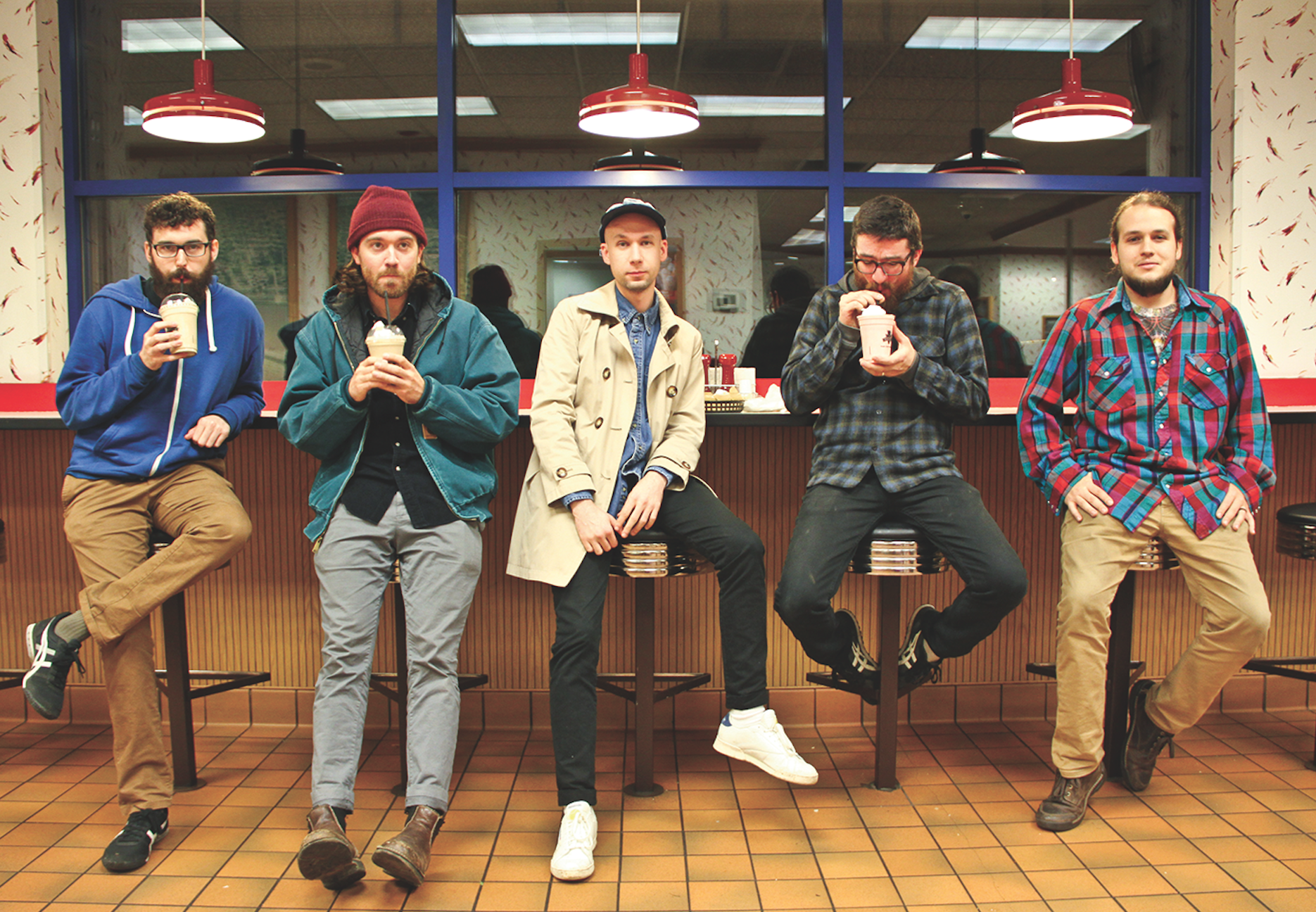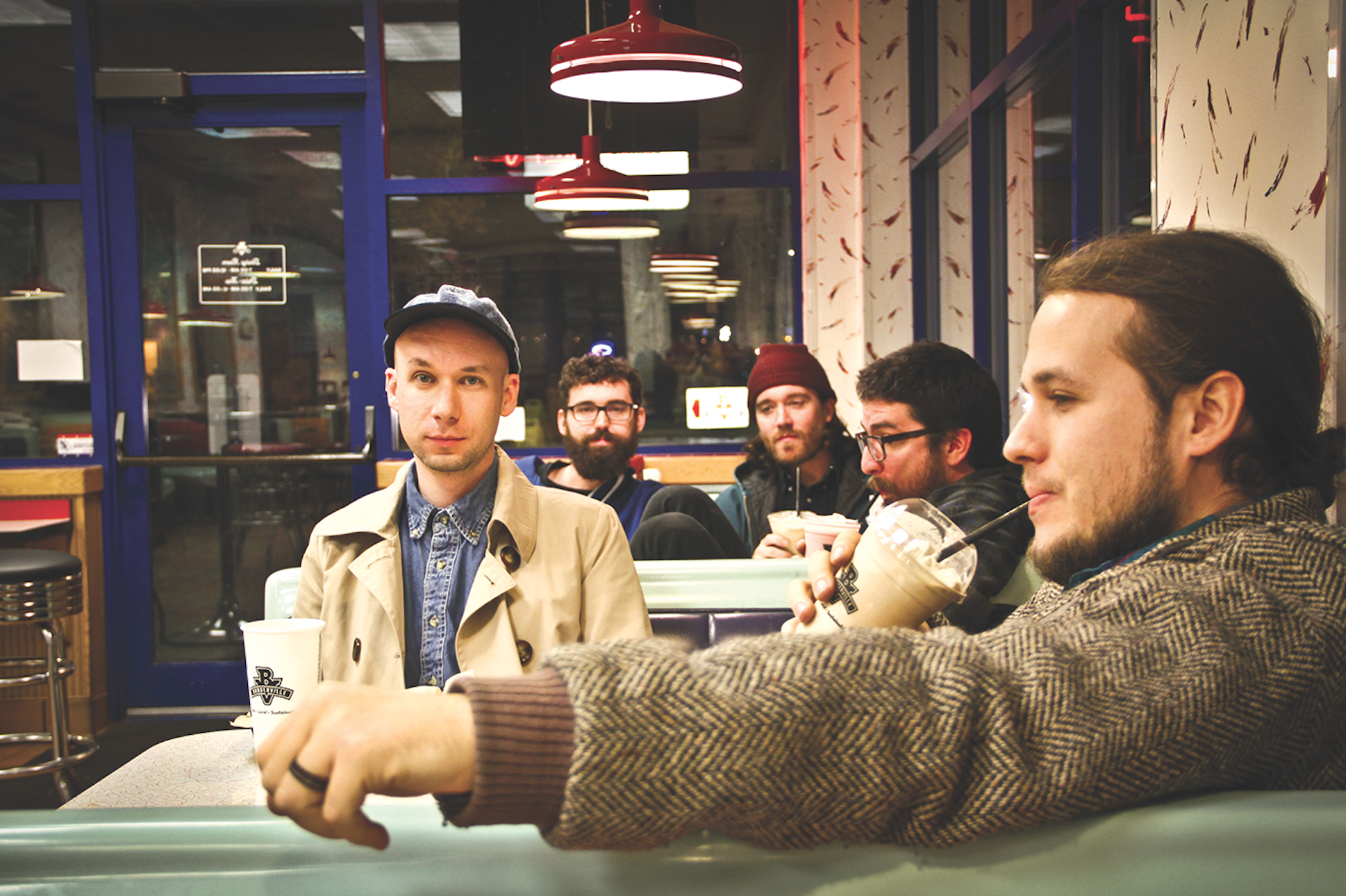Sinless


Interviewing bands is often an awkward experience; there’s a lot of pretense and a sense of wanting to both seem professional and to say the right thing. Meeting Cor Allen, the creative force behind Portland’s latest dream-pop gem, Sinless, was anything but that. We talked for more than an hour about what led Allen to Portland, about his experience immersing himself into the music scene here and his creative process.
Throughout the conversation, Allen made it overwhelmingly clear that writing music is his outlet to process and learn from life’s wonderful and harsh realities. Both Melodie, Sinless’ brand new release, and Ethereality, a four-song EP released in 2015, were fueled by a sense of loss that also inspired his move to the West Coast. The lyrics throughout Melodie cut insistently and quickly to that point. In the opening verse of “Strange Reality,” Allen sings, “I can’t seem to get over you.” He pairs these straightforward lyrics with ultra groovy guitar parts and lilting, psychedelic vocals that create an interesting paradox between words and music.
Between chatting with Allen and listening to both Ethereality and Melodie many times, one thing became exceedingly clear: Allen’s life and the way he shares his experiences are universal. Two years ago, Allen packed up his life in Pittsburgh and headed to Portland with the hope of starting over and creating something new. Since his move to Portland, Allen has played for Jackson Boone and eventually began recruiting the help of John Walsh, Lynn Nicholson, Chelsea Smith and Pete Bosack — an overwhelmingly gifted and involved group of local musicians. Together they bring Sinless to life on stage, as they will for the EP release show Dec. 4 at Holocene. In my interview with Allen, I was able to learn exactly what it took to get Sinless off the ground and in front of an audience.
Eleven: You moved from Pittsburgh a couple years ago. Was music the reason you decided to move to Portland?
Cor Allen: Yeah.
11: Was that because you didn’t like the music scene in Pittsburgh?
CA: That was part of it for sure. I wanted to go somewhere that had more musicians. I had just gotten out of a relationship, kind of had my heart broken. Also, my previous band broke up. And I had a songwriting partner, who is still one of my best friends, Derek White, who is a fantastic musician. We worked together for years and he decided to go back to school and do something else. So I lost him in that sense, and I lost my relationship.
I was just lost and the thought of starting another band in Pittsburgh was a horrible feeling. It’s a small scene and you end up recycling the same people over and over. And I thought if I put an ad up for someone [who’s] into dream pop, no one is going to know what I’m talking about. So I thought, I need to go where there are more people who are into this. I had a buddy that lived here, and he was kind of involved in the music scene. I’d never even been here.
11: You just picked up and moved?
CA: Yeah. I was pretty down on my luck and got into spirituality. I got into Tony Robbins because I needed anything, and listening to Tony Robbins just put this plan into action. So I sold all my stuff except for my music gear, put it in my car and drove out here.

11: Had you considered moving to Philly? Is it not conducive to the kind of music you want to make?
CA: It is now more than it was. Philly is kind of blowing up right now. I was looking at Stereogum’s 50 New Bands or whatever and about half of them were from Philadelphia.
11: Do you like the West Coast better than the East Coast?
CA: Yeah! I had no idea what I was getting myself into when I moved here. And when I first moved here I felt like I was a little too brash for people, but I’ve mellowed out a lot since I moved here.
11: Do you think you’ve found a community in the music scene?
CA: In a sense. I met all my bandmates on Craigslist, which is kind of crazy. I’m kind of socially anxious in large groups and I was struggling with that when I first moved here, not knowing anybody. I was trying to force myself. I was thinking, “I just have to go to every show and just start meeting people. How else am I going to get engrained in the music scene and find bandmates?”
One day, I was sitting at work and I was really stressed out about it and I was like, “I should just join a band that’s already established.” I literally opened up Craigslist and one of the first ads I saw was singer, folk songwriters, psychedelic, bluesy stuff and it was this guy, Jackson Boone. I responded to his ad and just listed all the gear I had basically and said, “I’m the perfect guy for your band.” He texted me about a half an hour later and said, “Do you want to come over in a couple nights and jam?” So I ended up joining his band for a while and met a lot of people through him, and that helped a lot.
11: Do you think that spending time around people who make art similarly to you and are interested in the same things has helped your creative process?
CA: It definitely has. The one thing that has happened here that has surprised me is being in practice spaces where I’ll literally be walking down the hall and hear two or three bands playing and think to myself, “Wow, this all sounds amazing. I wonder who that is!” That really never happened before, so just being in practice spaces with other bands is really inspiring. And there are certain bands that have inspired me: Jackson is one of them. Wave Action is one of my favorites. After I saw them live, I got into listening to more new wave and power pop, which has influenced the writing for our new album.
11: Your new EP, Melodie, was recorded all by yourself. Did you write it by yourself as well?
CA: Yeah, I’m literally the only person who worked on that.
11: What did that process look like? Conceptually through to recording.
CA: That was basically right after my girlfriend and I broke up, and I didn’t know what kind of new project I was going to do, but I wanted to do something. I’d never used recording software before or anything. The guy that I was in a band with before did everything to record for us. So I just started opening up GarageBand and sketching out ideas. It started out really rough, but I became obsessed with it.
The song “Cool” that’s on Melodie was the first song I recorded…ever. It started out really rough, and I just kept working on it every night obsessively. I was only going to use these as demos, and then I just kept layering and layering and then when I got here I put them up on SoundCloud and my bandmates said I should release them. And then my bass player remixed and mastered it for us.
11: Do you enjoy the process of writing alone more or as much as writing collaboratively?
CA: It’s really either one or the other for me. I’ve been a lead guitarist in bands where I enjoyed writing the guitar parts for someone else’s music, but I’ve never actually written songs with anybody.
11: So you write all of the music then.
CA: Yeah, I write even the bass lines and the drum parts. It’s going to move in a more collaborative direction, but the way the timing worked out, I already had all these songs and I met guys who were down to learn them.
I’m definitely a perfectionist about it, so I at least want to have all the sketched ideas for all the parts written myself before I take them to the band. With our album, I had all the parts written, but then our drummer was like, “What if I do this instead?” I was like, “Yeah that’s totally cool.”
11: How was it working with Riley Geare as a producer?
CA: The thing about working with him was how much I learned about performance. I’m obsessed with writing; it’s my passion and it’s all I really think about. So it was one of those things where you realize where your weaknesses are.
Good producers know how to get a great performance out of somebody, and that’s what he did. He taught me so much about playing behind the beat, how it adds to the groove. We would listen to Kendrick Lamar and D’Angelo in the studio, and he would say, “Listen to how that bass sits and where it sits. Listen to where that guitar sits in the mix.” And that stuff was instrumental to our album being as groovy as it ended up being.
11: Do you think spirituality has had a big influence on your music since the move?
CA: I go in and out of phases with spirituality. And I’m kind of ashamed to admit that I use it as a crutch in a way. And I think a lot of people do that. I would say, if anything, it’s taught me to reflect. It’s more about meditating and making sure I’m not closing my heart and my own ability to experience.»
– Sarah Eaton




